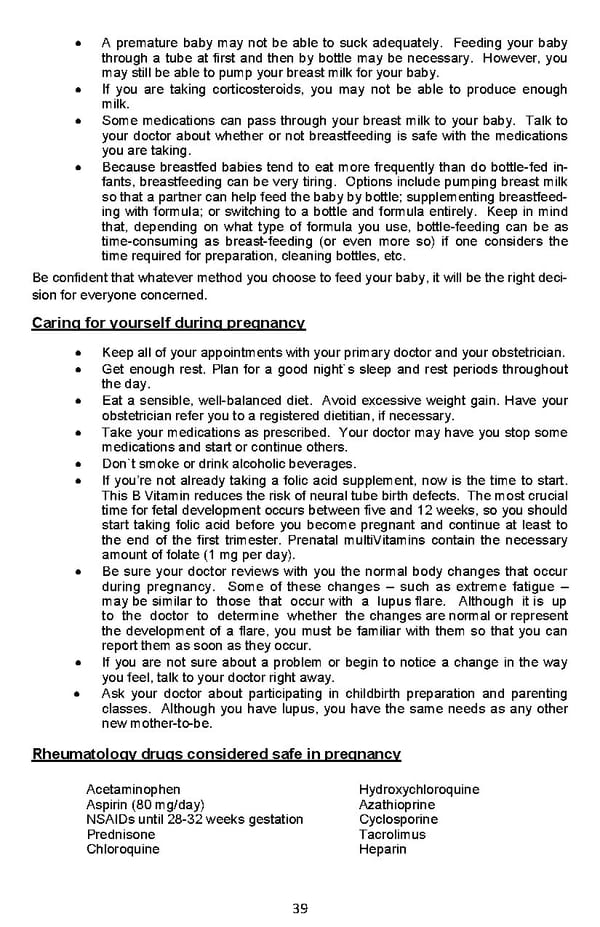• A premature baby may not be able to suck adequately. Feeding your baby through a tube at first and then by bottle may be necessary. However, you may still be able to pump your breast milk for your baby. • If you are taking corticosteroids, you may not be able to produce enough milk. • Some medications can pass through your breast milk to your baby. Talk to your doctor about whether or not breastfeeding is safe with the medications you are taking. • Because breastfed babies tend to eat more frequently than do bottle-fed in- fants, breastfeeding can be very tiring. Options include pumping breast milk so that a partner can help feed the baby by bottle; supplementing breastfeed- ing with formula; or switching to a bottle and formula entirely. Keep in mind that, depending on what type of formula you use, bottle-feeding can be as time-consuming as breast-feeding (or even more so) if one considers the time required for preparation, cleaning bottles, etc. Be confident that whatever method you choose to feed your baby, it will be the right deci- sion for everyone concerned. Caring for yourself during pregnancy • Keep all of your appointments with your primary doctor and your obstetrician. • Get enough rest. Plan for a good night`s sleep and rest periods throughout the day. • Eat a sensible, well-balanced diet. Avoid excessive weight gain. Have your obstetrician refer you to a registered dietitian, if necessary. • Take your medications as prescribed. Your doctor may have you stop some medications and start or continue others. • Don`t smoke or drink alcoholic beverages. • If you’re not already taking a folic acid supplement, now is the time to start. This B Vitamin reduces the risk of neural tube birth defects. The most crucial time for fetal development occurs between five and 12 weeks, so you should start taking folic acid before you become pregnant and continue at least to the end of the first trimester. Prenatal multiVitamins contain the necessary amount of folate (1 mg per day). • Be sure your doctor reviews with you the normal body changes that occur during pregnancy. Some of these changes – such as extreme fatigue – may be similar to those that occur with a lupus flare. Although it is up to the doctor to determine whether the changes are normal or represent the development of a flare, you must be familiar with them so that you can report them as soon as they occur. • If you are not sure about a problem or begin to notice a change in the way you feel, talk to your doctor right away. • Ask your doctor about participating in childbirth preparation and parenting classes. Although you have lupus, you have the same needs as any other new mother-to-be. Rheumatology drugs considered safe in pregnancy Acetaminophen Hydroxychloroquine Aspirin (80 mg/day) Azathioprine NSAIDs until 28-32 weeks gestation Cyclosporine Prednisone Tacrolimus Chloroquine Heparin 39
 Living Well With Lupus Facts Booklet Page 38 Page 40
Living Well With Lupus Facts Booklet Page 38 Page 40